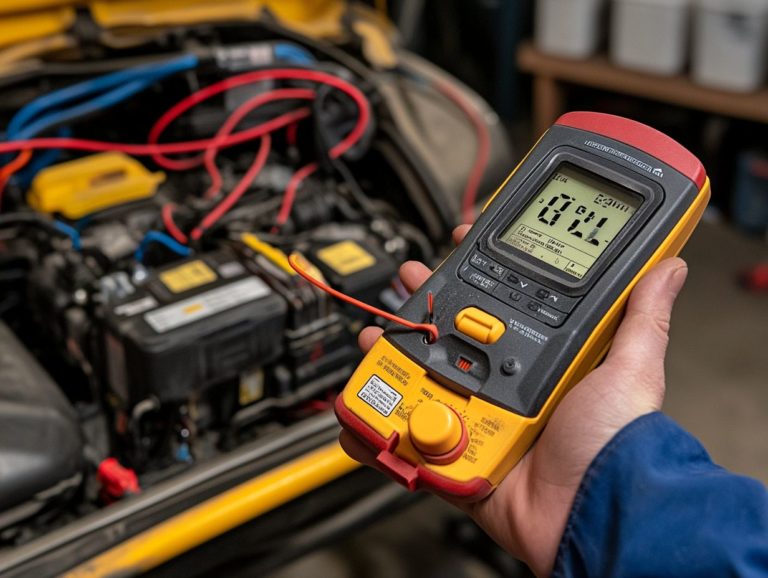How to Check if Your Car’s AC is Working?
Is your car’s air conditioning system feeling more like a furnace on wheels? Understanding how your car’s air conditioning works is key. It helps keep you comfortable during hot summer drives.
This article delves into the key components of your AC system, the telltale signs of potential malfunction, and straightforward troubleshooting steps you can easily implement. It also covers common causes of AC failure and guides you on when to enlist the help of a professional. Stay cool and well-informed!
Contents
- Key Takeaways:
- Understanding Car Air Conditioning Functionality
- Signs That Your Car’s Air Conditioning May Not Be Working
- Steps to Check Your Car’s AC
- Possible Causes of AC Failure
- When to Seek Professional Help
- Frequently Asked Questions
- How to Check if Your Car’s AC is Working?
- What are the signs that your car’s AC is not working?
- What should you do if your car’s AC is not blowing cold air?
- How can you tell if your car’s AC needs to be recharged?
- What should you do if your car’s AC is making strange noises?
- Why does your car’s AC have a foul odor?
Key Takeaways:

- Check your car’s AC regularly. Look out for signs like strange noises or weak airflow.
- Use basic troubleshooting techniques to identify potential issues, such as checking the compressor and refrigerant levels.
- If your car s AC continues to have problems, it may be time to seek professional help to accurately diagnose and address the issue.
Understanding Car Air Conditioning Functionality
Understanding the mechanics of your car’s air conditioning system is crucial for enjoying comfortable rides on those sweltering summer days. The AC system includes important parts like the compressor, condenser, and air filters. These parts work together to keep your car cool.
When everything functions properly, the AC transforms your ride into a cool oasis. However, when issues arise, such as a malfunctioning compressor or clogged filters, you might find yourself dealing with weak airflow or, worse yet, warm air infiltrating the cabin. This highlights the importance of regular car maintenance to keep your AC in top shape.
Components and How They Work Together
The efficiency of your car’s air conditioning system hinges on several key components, including the compressor, condenser, and air filters. Each of these elements plays a vital role in creating optimal airflow and cooling performance.
These components work together seamlessly to maintain refrigerant levels, ensuring that cool air circulates effectively throughout your vehicle. The compressor, often dubbed the heart of the system, compresses the refrigerant and pushes it toward the condenser, where it changes phase and releases heat. Once cooled, the refrigerant makes its way to the evaporator, allowing the air filters to purify the incoming air before it flows into the cabin.
By grasping how these elements operate both individually and collectively, you can truly appreciate their critical role in delivering a refreshing driving experience, especially during those sweltering summer months.
Signs That Your Car’s Air Conditioning May Not Be Working
Recognizing the signs that your car’s air conditioning system might be on the fritz is essential for prompt repairs. This ensures you remain comfortable during sweltering weather. Keep an eye out for common indicators such as warm air wafting from the vents, weak airflow, or unexpected hissing sounds and unpleasant odors.
You should also be alert to the system cycling more frequently than usual. These warning signs often hint at underlying issues that, if overlooked, could spiral into more serious complications for your vehicle s HVAC system.
Common Indicators of AC Malfunction

Common indicators of an air conditioning malfunction can present themselves in several noticeable ways, such as warm air blowing from the vents or weak airflow that fails to cool the cabin effectively.
You might detect strange odors wafting from the ventilation system, often described as musty, which could suggest mold or mildew lurking within the AC unit. Additionally, if you hear unusual noises like clicking, rattling, or hissing, these could signal failing components that need your immediate attention.
Visible leaks beneath the vehicle are another red flag that your air conditioning may need repair.
Don’t ignore these warning signs! They can lead to bigger problems and higher repair costs. It’s crucial for you to address any abnormalities promptly to keep your vehicle running smoothly.
Steps to Check Your Car’s AC
Checking your car’s air conditioning (AC) system can help identify potential issues before they require a visit to the auto repair shop. Start with some straightforward DIY troubleshooting steps.
Check the cabin air filter for any clogs. Use an A/C gauge to assess the refrigerant levels through a pressure check. These initial measures can uncover airflow issues or compressor problems that might hinder your AC’s performance.
Basic Troubleshooting Techniques
Basic troubleshooting techniques for your car’s AC can greatly enhance its performance and longevity. Start by checking the filters and using an A/C gauge for pressure assessments.
Check the cabin air filter condition too. A clogged filter can seriously impede airflow and diminish cooling efficiency. Also, inspect the compressor for any signs of leaks or damage, as this critical component influences the entire system s functionality.
Regularly assessing refrigerant levels is essential. This ensures that the air conditioning unit runs smoothly and effectively cools the cabin. Don t ignore unusual noises; they could indicate a serious problem!
Possible Causes of AC Failure
Knowing the potential causes of air conditioning (AC) failure in your vehicle is crucial for effective repairs and maintenance. Familiarize yourself with common culprits: compressor issues, low refrigerant levels, and airflow problems from a malfunctioning blend air door or faulty fan motor.
Look for any visible damage or leaking fluids within the automotive HVAC system. These can greatly impact your AC’s performance, resulting in discomfort during sweltering summer drives.
Identifying and Addressing the Root Issue

Identifying and addressing the root cause of your car’s AC issues is essential for restoring optimal performance and preventing future failures.
One common challenge involves compressor issues, which can show up as strange noises or a failure to produce cold air. A thorough inspection is crucial to determine if the compressor needs lubrication or replacement.
Low refrigerant levels can hinder performance. Regular checks are necessary to catch leaks early and facilitate recharging, ensuring your system runs efficiently.
Clogged filters can obstruct airflow. By replacing or cleaning these filters routinely, you can significantly enhance your AC’s ability to maintain a comfortable environment.
By recognizing these symptoms early, you can effectively implement solutions that will boost the longevity and functionality of your air conditioning system.
When to Seek Professional Help
Knowing when to get expert help with your car’s AC can save you time and money, especially when you re grappling with persistent signs of trouble that suggest underlying issues.
If your DIY fixes aren’t working, or if you encounter significant airflow problems or unusual odors, it s wise to reach out to a trusted auto technician or professional mechanic.
Renowned service providers, such as Zima Automotive in Springfield, OH, are equipped to conduct a comprehensive diagnosis of your cooling system, efficiently pinpointing and resolving any air conditioning woes.
Signs that Your AC Needs Professional Repair
Look for signs that your car’s air conditioning (AC) needs professional repair. Watch for constant airflow problems or significant drops in cooling performance.
Be alert to unusual noises when the AC is running. Hissing or grinding sounds can be serious red flags.
Don t overlook any noticeable leaks under your vehicle; they could signal a serious issue.
If you notice these symptoms, consult a qualified technician for an accurate diagnosis. They will determine if the problem is a refrigerant leak (the fluid your AC needs to cool air), a faulty compressor, or a clogged cabin filter (which cleans the air inside your car).
With specialized tools, technicians can restore your AC s cooling efficiency and extend its lifespan. Enjoy a comfortable driving experience even during the hottest months!
Frequently Asked Questions
How to Check if Your Car’s AC is Working?

If your car’s AC is not functioning properly, it can make for an uncomfortable driving experience. Follow these steps to check if your car’s AC is working:
What are the signs that your car’s AC is not working?
Signs that your car’s AC is not working include lack of cold air, strange noises, and a foul odor when it s turned on.
What should you do if your car’s AC is not blowing cold air?
If your car’s AC is not blowing cold air, check the temperature setting first. Make sure it is set to “cool.” If that doesn t help, you might need to recharge your AC refrigerant.
How can you tell if your car’s AC needs to be recharged?
If your AC isn’t blowing cold air, it may need a recharge. Check the system pressure using a pressure gauge to confirm.
What should you do if your car’s AC is making strange noises?
If your AC is making strange noises, it could indicate a larger issue. Take your car to a mechanic for an inspection to find the cause.
Why does your car’s AC have a foul odor?
A foul odor from your AC could be due to mold or mildew growth. This can happen with moisture buildup and can often be fixed by cleaning or replacing the AC filter.






